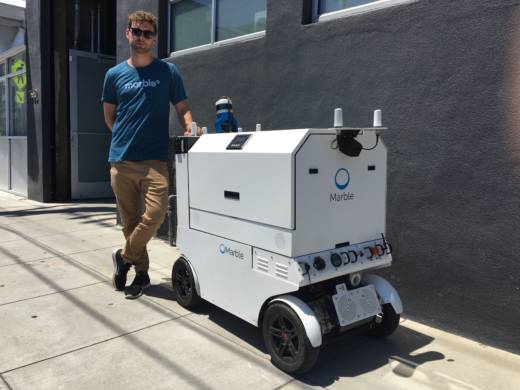The company Marble test-drives its food delivery robots at a little park near its offices in Potrero Hill. The company’s would-be food deliverer of the future is not fancy. The robot is basically an oversized cooler stuck on top of an electric wheelchair frame. It looks like some bulky droid you would see sliding along in the background an old "Star Wars" movie. The roving robot can hold a couple of bags of food, and it navigates with a few sensors and cameras.
Marble is one of several companies developing robots to deliver food. If these companies get their way, fleets of their bots could soon be rolling around urban sidewalks, carrying food once delivered by a human hand. Robots could provide a cheaper, quicker way to get customers food; but this vision has raised concerns about sidewalk safety, job loss and the societal impacts of using robots to increase the speed and ease of consuming goods and services. In San Francisco, one supervisor, Norman Yee, wants to stop the delivery robots from using the city’s sidewalks.
Matthew Delaney is CEO of Marble. He occasionally takes the robots on a test drive in the park, where they're a big hit with the kids who play there. Not that long ago, Delaney could have been one of those excited kids. Back in middle school, he built an automatic feeder for his family’s fish. That way humans wouldn’t have to feed them.
“The thought never left me,” Delaney said. “We can create these incredible tools and machines and they can do meaningful work for people, and we don't have to do the boring tasks that we don’t want to do.”
Marble and competitors like Starship Technologies are trying to automate what is known in delivery lingo as the "last mile.” It’s the final leg of delivery, where a product is brought to a customer. It is costly and requires a lot of delivery workers. Automating this final step could save companies money, but it could also cost jobs.
